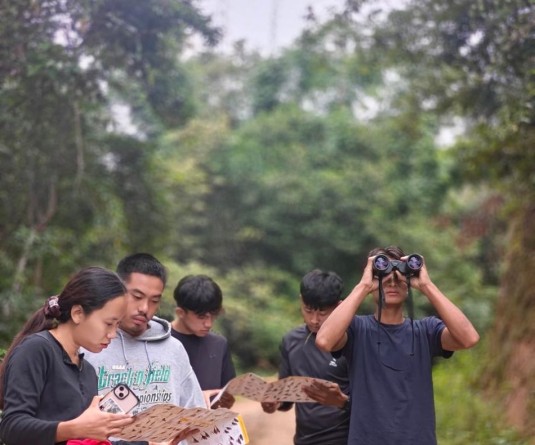
Ngullie, O. Grace
Centre for the study of Law and Governance, JNU, New Delhi
The recent Guwahati High Court's ruling striking down 33% reservation for women in the Municipal and Town Councils Elections in Nagaland by referring specially to Art.371A of the Indian Constitution can have serious implications on status of women in the region. It would mean that the state is failing to strive what our Constitution stands for i.e., gender equality and elimination of discrimination against women (Art.14 provides for Equal protection of laws, Art.15 (1) says that the state shall not discriminate against any citizens on grounds only of religion, race, caste, sex, place of birth or any them and Art.15 (3) states that nothing in the Art 15 shall prevent the state from making any special provisions for women..) Even though the decision advocates Naga's historical customs and conventions, it neglects our constitutional ideals which try to make the ‘starting line of race’, same for men and women, towards the path of development. Our Preamble secures to all its citizens justice- social, economic and political, and equality of status and opportunity. But under Naga customary laws and patriarchal norms, men are considered synonymous to 'domination', 'benefit’, 'power', 'privilege' whereas women are considered inferior and hence subservient to men. The present scenario is grave as 'man-controlled politics' suppresses women's voice, and it seem women's participation would conflict with the traditional norms and customary laws. If government is for the people and everything it does relates to people’s welfare and if women constitute an equally significant part of the society as men, why is women's exclusion being perpetuated through such political mindset?
In addition, Naga women are denied the very essence of liberty of thought and expression. Recently, women in Nagaland initiated rallies to observe 1st of October as 'Black day' to express their disapproval against the injustice meted out to womenfolks.However some organizations, viz. Ao Senden and ENPO banned women to hold rallies in their respective districts. Moreover, the ENPO threatened the women organizations that if they participate in the rally, the women themselves would be held responsible. Is this an outright acknowledgment that men-constituted organizations in Nagaland are opposing Naga women's democratic participation? Are they warning the women to refrain from democratic practice? Such attitude shown by these organizations only strengthens 'mediocracy' and not democracy, which is objectionable. Do they fear of losing their 'power' through oppression and domination, as women have the potential to fare better by actually working for the people? Do the men ever regret for their own actions when they do not allow women, the very person they turn to, to fulfill their psychological and physical needs, to have adequate role and attention as they exercise in the society or in government representations? Should men, as human beings, oppress and subjugate women, silencing and making them invisible and voiceless? Should women be forbidden to make decisions that concern their own life? Should one ask when can women speak freely? Should one interrupt or oppose when women speak, demanding equal opportunities and equal protection of laws? Inequity will persist as long as there is an unwillingness to share power. In claiming to have won a place of power with discriminatory practices than to have won in true spirit cannot make men competent leaders but backward learner. Real power can be seen and achieved when the poor and the disadvantaged are empowered.
Herein, it is important to state why women need political representation and political empowerment and why gender quota is required in politics. Nagaland has an unimpressive record with no women representative in the State Legislative Assembly ever since it attained statehood in 1963. The patriarchal norms and conventions, and the conservative social customs of the Nagas have compelled women to remain within the confines of the house. There has hardly been any exposure for women to take up diverse roles outside the household and as a result they now face difficulty to come at par with men on the political platform. Women have been underrepresented in the past and in this context, the situation in Nagaland still depicts a pitiable scenario. Women have long been denied opportunities to develop in the past and did not get the opportunity to develop their skills and hence they lack experience in the political front. The gender reservation will serve as a helping hand to the women by providing avenues to improve their position, and not just remain in their shackled-customized-household role. This is why the reservation for women should be seen as a way forward to empower the long suppressed women. When women are represented in the decision making bodies, their interests will get articulated and they can deal with issues affecting their lives.
It should be understood that silencing women is 'violence' in itself because you are not just suppressing voice but also killing someone’s freedom to live a life they deserve. Men safeguard their interests, and women deserve to exercise the same. In fact, the government should help women by enabling them to participate in elections, at all levels, rather than favoring a male-customized society. However in Nagaland, the Naga Hoho, ENPO and various other tribal organisations have always been opposing women's quota and have sadly taken shelter under the guise of conservative customs and traditions thus denying space to women. While they seek to derive and retain their power through patriarchal means, it also shows their own fear and insecurity and thus unwillingness to empower their own people. Bill Gates has once said "As we look ahead into the next century, leaders will be those who empower others". At this instant, as concerned citizens, we should demand for enlightened leaders and elders who will guide us with rationale, freedom and equality, and promote liberal and egalitarian attitude towards gender issues.




